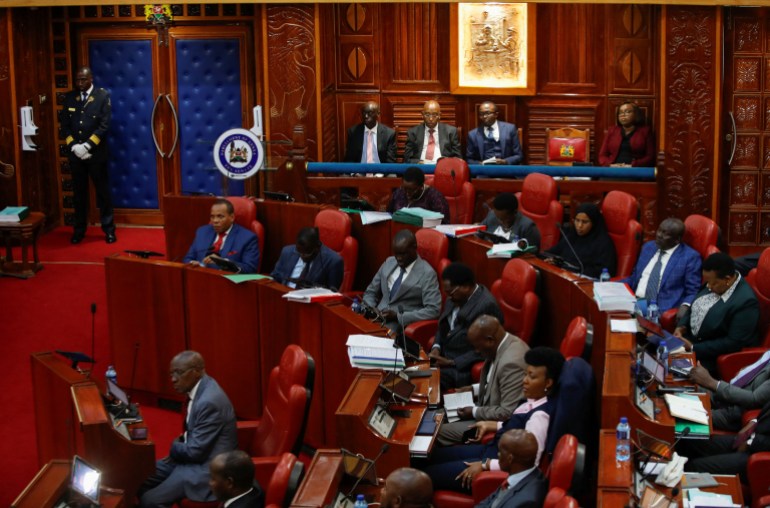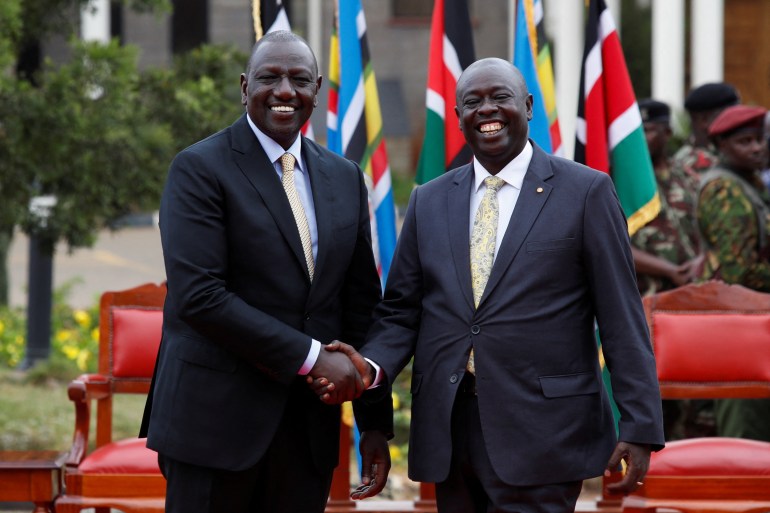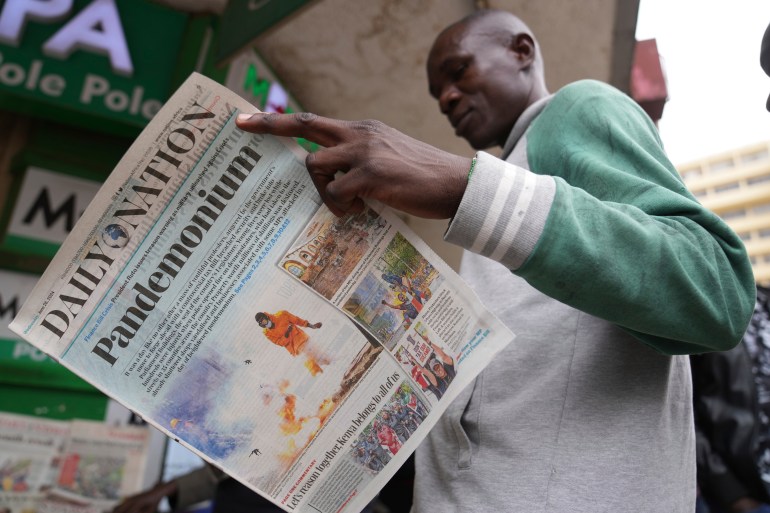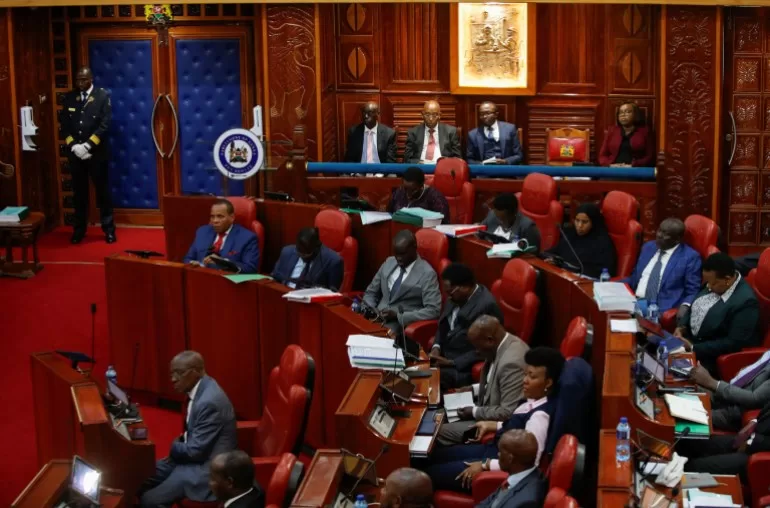Kenya’s Deputy President Rigathi Gachagua has been removed from office after he was impeached in a historic vote in the country’s Senate on Thursday night.
Gachagua becomes the first deputy president to be removed from office in this way since impeachment was introduced in Kenya’s 2010 constitution.
The 59-year-old, who was once a close ally of President William Ruto, faced 11 charges including insubordination to the president, inciting ethnic violence, corruption, undermining government and money laundering, among others.
Gachagua rejected the charges against him as being politically motivated.
But the Senate – which only had to find him guilty of one charge to remove him – decided he was guilty of five of the 11 that Gachagua faced.
Thursday’s vote came at the end of a two-day Senate trial hearing, during which the now former deputy president and the National Assembly both argued their cases.
Gachagua, who previously served as a member of parliament, was elected into office to serve alongside President Ruto in August 2022. The two defied the odds to win the election, but their relations have since sputtered, even as Ruto has warmed to opposition leader Raila Odinga, his main rival in the elections.
Here’s all you need to know about the unfolding situation:

What happened?
“Not guilty,” Gachagua said in response to each of the 11 charges against him as they were read by Senate Clerk Jeremiah Nyegenye on the first day of his Senate trial on Wednesday.
On Thursday, Gachagua was expected to appear in the Senate as a witness, but did not show up. His lawyers said he fell ill with “intense chest pains” and was taken to hospital. Despite his absence, senators voted to proceed with the impeachment hearing, forcing his lawyers to withdraw from the process.
At the end of the night, senators found him guilty of five counts of “gross violation” of the constitution including practising ethnically divisive politics and threatening judges. He was, however, cleared of six charges, including corruption.
Last week, the lower house of parliament, the National Assembly, voted 282-44 to impeach the deputy president. The motion was then forwarded to the Senate, which required a two-thirds majority to remove Gachagua – something they secured during Thursday’s vote.
Appearing before the National Assembly on October 8, Gachagua denied all charges against him, saying they were politically motivated and lacked legal merit. This Wednesday, one of his lawyers, Elisha Ongoya, said the allegations against him were false.

How did it come to this?
Gachagua, a multimillionaire from central Kenya, helped President Ruto secure critical votes from the region – where he wields significant influence among the Kikuyu, Kenya’s largest tribe to which the ousted vice president belongs. That support in turn helped Ruto win the national election two years ago.
However, the two have since fallen out, with Gachagua complaining of being sidelined by the president and being kept in the dark about important events.
Gachagua has faced accusations from critics that he supported the youth-led antigovernment protests in June and July, which ended in the president withdrawing a controversial plan to raise taxes. This further exposed the rift between the two.
In June, Gachagua also blamed the director-general of the National Intelligence Service for not adequately briefing Ruto on the severity of the protests. After those comments, parliamentarians critical of Gachagua accused him of undermining the state security services, and therefore the president, which only increased tensions.
Gachagua pointed out that Ruto, too, had in 2022 criticised then-Inspector General of Police Hillary Mutyambai, calling him incompetent, without facing any consequences.
“President William Ruto and I have been calling out senior government officials when they fall short of expectations. The director-general is no exception; he is not above the law and is accountable to the people of Kenya for his performance,” he said on October 8, before the National Assembly.
After withdrawing the tax bill, Ruto also reshuffled his cabinet and appointed several allies of main opposition leader Odinga as ministers, a move seen as weakening Gachagua’s influence.
Is the Ruto-Gachagua fallout unprecedented?
Far from it.
For many, the move might seem like a walk down political memory lane. In 2018, former President Uhuru Kenyatta and Ruto, his then-deputy, had a bitter public falling out. A handshake between Kenyatta and Odinga was the final, lethal injection that killed that political alliance.
Ruto is on record saying he would not publicly humiliate his deputy while alluding to his troubled relationship with Kenyatta during their second term.
Although Ruto has not commented publicly on Gachagua’s impeachment, the deputy has said the impeachment could not have happened without the president’s approval.
Political analyst Herman Manyora believes the ruling coalition, Kenya Kwanza Alliance, is playing politics. According to him, things reached a state where the president thought he couldn’t work with his deputy, so his deputy must go.
“One would have hoped he would tolerate the deputy even if they are messy. But the speed with which they want to remove him, the determination to remove him, the vengeance that seems to go with it is rather baffling,” Manyora said.
“How, after promising that you wouldn’t do that using very clear words, do you turn around and do it? But these are politicians. They say one thing and do another.”
How has the Kenyan public reacted?
Kenyans have taken to social media platforms to express their views on the impeachment of the deputy president.
Supporters and opponents of Gachagua clashed in public on October 4, with the process turning violent in some places.
Meanwhile, supporters from his home turf in the Mount Kenya region called for the impeachment of the president as well, saying they voted for them both and if the deputy president has committed crimes leading to his impeachment, then the president should be impeached for the same crimes.
“Gachagua’s impeachment is a good initiative but can they now extend it to the president and all other elected officials? Investigate the president’s major appointments of people from his community only, investigate members of parliament appointments of Constituency Development Funds (CDFs) committees. What’s good for the goose should be good for the gander,” said Erick Mwaura, a 32-year-old who works in a land valuation firm in Kilifi, Kenya, a part of the former deputy president’s home turf.

Kenyans have been calling for the resignation and impeachment of President Ruto since the antigovernment protests in which more than 50 people died.
According to Interior Minister Kithure Kindiki, 1,208 people were also arrested during the protests and 132 people were reported missing during the same period. The whereabouts of some of the missing are still not known.
Abductions and police brutality were the driving force behind the calls for Ruto to resign.
However, according to some analysts, Gachagua’s impeachment might be the final nail in the coffin for a president losing the little public support he has left.
What’s next?
An overwhelming 282 members of the National Assembly voted for Gachagua’s impeachment. In the Senate, a two-thirds majority of the 67 senators also endorsed the motion to remove him.
Under Kenya’s constitution, removal from office is automatic if approved by both chambers.
However, Gachagua can challenge the impeachment in court – something he has said he will do.
A three-judge bench has already been allocated to listen to cases challenging the impeachment.
According to Kenya’s laws, the president has 14 days to nominate a new person for the position of deputy president, after which the National Assembly will have 60 days to deliberate on the nominee. However, early on Friday, Ruto nominated Kithure Kindiki, the interior minister, for the post of deputy president.
Speaking to Al Jazeera before the impeachment vote on Thursday, lawyer Charles Kanjama said such a fast-tracked process would suggest a “choreographed move”.
“By end of day Friday they [the Senate] might even have approved the president’s nominee,” he explained. “This means a process that should legally take 74 days would take only 24 hours.”
Lawyers say it could take a court months or years to decide on Gachagua’s expected challenge to the impeachment, making it difficult to remove the person who will take over from him, even if the ousted vice president were to eventually win a legal battle.
